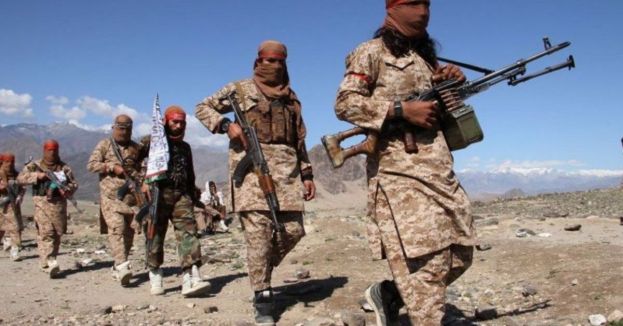WATCH: NICOLE WALLACE AND THE END OF DEMOCRACY![]()
YIKES! IS MARJORIE TAYLOR GREENE LOSING HER 'GRIP' IN POWER STRUGGLE?![]()
WATCH: FETTERMAN CONFRONTED BY A PRO-HAMAS ACTIVIST![]()
TESLA IN TURMOIL: MUSK OUSTS TOP EXECS AND PREPARES FOR MASSIVE LAYOFFS, WHAT'S HAPPENING?![]()
PROFESSIONAL "PROTEST CONSULTANT" CAUGHT ON VIDEO STIRRING UP CHAOS AT COLUMBIA UNIVERSITY![]()
PUMP AND DUMP: VIRAL "BOCA BASH" VIDEO SPARKS MAJOR INVESTIGATION![]()
DID KRISTI NOEM'S DISTURBING ACTIONS RUIN HER SHOT AT VP?![]()
WTAF: BIDEN ADMINISTRATION IS 'SERIOUSLY CONSIDERING' TAKING IN REFUGEES FROM WHERE?![]()
A string of explosions struck Taliban vehicles in Afghanistan’s provincial city of Jalalabad over the weekend, killing eight people, including Taliban fighters. On Monday, three more explosions were heard across the city, an IS stronghold, with unconfirmed reports of additional Taliban casualties.
The Taliban are under pressure to contain IS militants, in part to uphold a promise to the international community that they will prevent the staging of terror attacks from Afghan soil. There is also a sincere expectation among conflict-weary Afghans that, despite fears and misgivings about the Taliban, the new rulers will at least restore a measure of public safety.
“We thought that since the Taliban have come, peace will come," expressed Feda Mohammad, a brother of an 18-year-old rickshaw driver who was killed in one of Sunday's blasts, along with a 10-year-old cousin.
"But there's no peace, no security. You can’t hear anything except the news of bomb blasts killing this one or that,” Mohammad stressed, speaking at the family home where relatives and neighbors gathered for a memorial ceremony, drinking black tea and reciting verses from the Quran.
The latest IS bombings come as the Taliban are faced with the daunting task of governing a country shredded by four decades of war. The economy is in free fall, the health system on the verge of collapse and thousands of members of the country's educated elite have fled. International aid groups predict worsening drought, hunger and poverty.
“Our misery has reached its peak,” Abdullah, a shopkeeper in Jalalabad, warned Monday, one day after IS claimed responsibility for the bombings that rocked the city the two days before.
“People have no jobs, people sell their carpets to buy flour ... still there are explosions and (IS) claims the attacks,” said Abdullah, who like many Afghans goes by one name.
The weeknd bomb blasts served as a reminder of the threat the militants pose. Just weeks ago, as American and foreign troops completed their withdrawal and frantic airlift from the country, IS suicide bombers targeted U.S. evacuation efforts outside Kabul international airport in one of the deadliest attacks in Afghanistan in years.
The events have bolstered fears of more violence, as IS militants exploit the vulnerability of an overstretched Taliban government facing massive security challenges and an economic meltdown.
Despite years of U.S. airstrikes and other military setbacks that shrank IS ranks, the United Nations reported this year the group “remains active and dangerous,” a threat to Afghanistan and the wider region.
For now, Taliban forces far outnumber IS militants and experts doubt the extremist group poses an existential threat to Afghanistan's new rulers. But if the bombings continue, predicted Franz Marty, a Kabul-based fellow at the Swiss Institute for Global Affairs, “it could become a large problem."








 Discover alternative ideas that will make you think
Discover alternative ideas that will make you think Engage in mind bending debate
Engage in mind bending debate Earn points, rise in rank, have fun
Earn points, rise in rank, have fun


